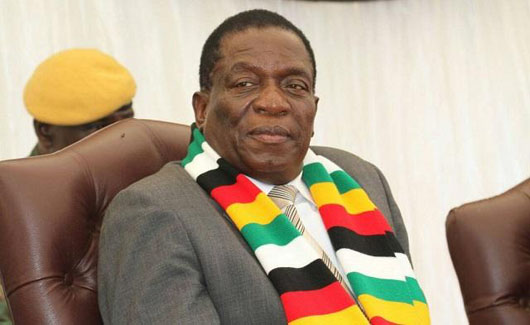by WorldTribune Staff, August 3, 2018
A former minister of state security who was installed as president after President Robert Mugabe’s ouster in a coup was elected Zimbabwe’s president on Aug. 2.
President Emmerson Mnangagwa, a longtime ally of Mugabe was declared the winner after a poll that was marred by the deaths of six people in an army crackdown on opposition protests, Reuters reported.

Mnangagwa said on Twitter: “I am humbled to be elected President of the Second Republic of Zimbabwe. Though we may have been divided at the polls, we are united in our dreams. This is a new beginning. Let us join hands, in peace, unity & love, & together build a new Zimbabwe for all!”
The 75-year-old Mnangagwa won 2.46 million votes against 2.15 million for 40-year-old opposition leader Nelson Chamisa in the first election since Zimbabwe’s army removed 94-year-old Mugabe.
Mugabe had been Zimbabwe’s only president since it declared independence in 1980.
By narrowly winning more than 50 percent of the vote, Mnangagwa avoided a run-off election against Chamisa.
Chamisa had insisted he was the winner, telling reporters on Aug. 2 that Zanu-PF was “trying to bastardise the result,” something “we will not allow.”
The Zimbabwe Electoral Commission said there was “absolutely no skulduggery.” The election marked the first time in 16 years that Zimbabwe’s government allowed EU, Commonwealth and U.S. election monitors into the country.
On Aug. 1, troops backed by armored vehicles and a military helicopter were sent in to put down demonstrations by opposition supporters who said Mnangagwa’s ZANU-PF party had rigged the election, the Reuters report said. Six people were killed as soldiers opened fire on the demonstrators.
On Aug. 2, police sealed off the headquarters of Chamisa’s Movement for Democratic Change (MDC) before storming the building and arresting 16 people, the report said. The search warrant said the police were looking for unlicensed firearms, grenades and stones.
“Deployment of troops reveals the uncomfortable truth that, eight months after Mugabe was ousted, the army remains the pre-eminent political force,” said Piers Pigou, a Zimbabwe analyst at the International Crisis Group think tank.
Newspaper vendor Farai Dzengera told Reuters that the army was “showing their true colors now. We thought they were our savior in November but they fooled us. What can we do? … They run this country.”
Subscribe to Geostrategy-Direct __________ Support Free Press Foundation
